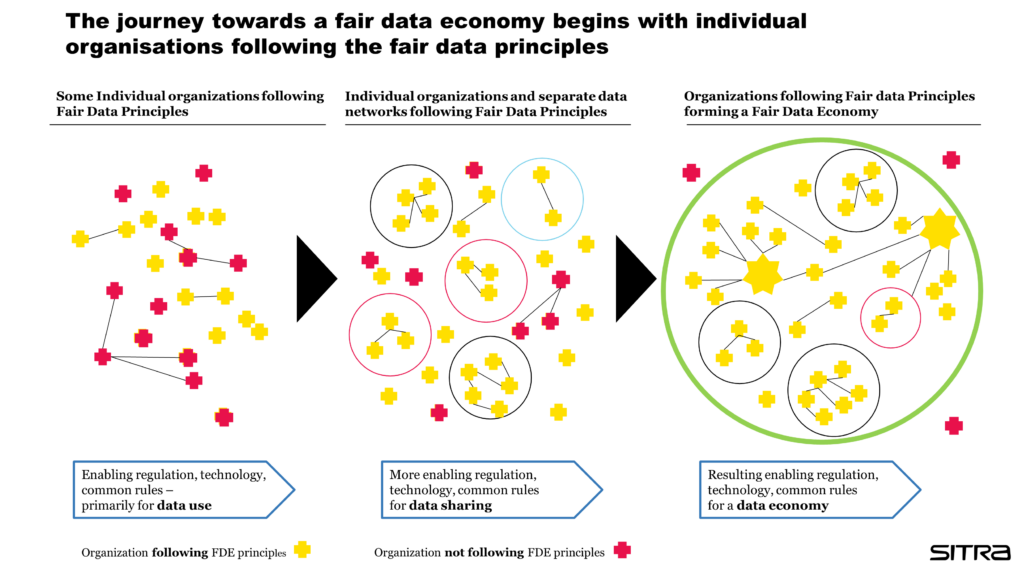The fair data economy and data sharing can provide a significant competitive advantage for European companies. Achieving the full potential of the data economy requires shared rules, tools and new ways of working.
The fair data economy principles and maturity model are tools for increasing understanding and activating organisations to move towards fair data economy practices. The principles are based on the European Union’s data economy principles published in 2019.
The fair data economy principles are the foundation for sustainable data-driven business
The fair data economy is based on six principles: trust, access, human-centricity, innovation, competence and sharing.
- A trustworthy organisation collects and uses data transparently and has ethical guidelines in place for the development and use of algorithms and artificial intelligence.
- A fair company provides its customers and partners with access to the data it collects on them as well as effective tools for managing that data. (For more information, read our article on managing data.)
- Human-centricity is reflected in respecting the rights of individuals and organisations and using people’s genuine needs and life circumstances as the foundation for service development.
- A fair company creates value with data not only for their own operations but also for their customers and society at large.
- The continuous development of competence and a culture of experimentation are important aspects of the management of these companies.
- In a fair data economy, the sharing of data separates the wheat from the chaff. Fair data economy practices can be implemented within companies, but co-operation and data sharing present companies with new opportunities for growth. As they are scaled up, these ecosystems enable a functional data market.
The maturity model promotes change
The maturity model approach, which has previously been used in business to gradually steer companies towards better and more efficient operations, is well suited to the needs of a fair data economy. The criteria highlight what issues an organisation should take into account in activities such as the collection, sharing and use of data as well as the development of data-driven services. From the criteria, a maturity model consisting of several stages is derived. Each stage is then described and the detailed steps for reaching the next stage are defined, along with recommended actions. With the help of the criteria and the maturity model, an organisation can assess the current state of its competence in the data economy, its desired state and the necessary actions and define a road map.
Based on the criteria, the first version of the Fair Data Economy Score tool to measure the maturity of a company’s data use was created. The development was carried out in the autumn of 2020 in close co-operation with the analytics and research company Gartner. Several Finnish and international specialists were involved in the development effort. Their views and ideas were collected in workshops and interviews. The result was the first version of the tool, completed in December 2020.
Six dimensions for evaluating fairness
The maturity model consists of six dimensions to be evaluated. Each dimension is measured by about 10 questions, with a starting level and target level initially defined for each. The responses to each of the dimensions are used as inputs to establish the result of the evaluation process, based on which the organisation is given recommendations on how to move towards the next stage of the maturity model.
The responses are assigned on a scale of one to five based on the maturity level, where a company in the first stage is only a beginner and a company in the fifth stage is a “superstar”.
The dimensions of the maturity model are as follows:
- data architecture and technology
- data management and capabilities
- the organisation’s values, culture and competence
- data-driven services
- value creation and profit performance
- operating as part of an ecosystem.
The ethical aspects of the use of data are embedded in each of these dimensions. The fair data economy maturity model differs from traditional ICT maturity models by seeking particularly open, transparent and trust-promoting approaches to the use of data.
The maturity model needs to be matured further – join the development effort!
A fair data economy is built piece by piece. The journey starts with individual pioneering companies whose understanding of the fair data economy increases and who adopt the principles of a fair data economy as guidelines for their operations. When individual companies are supported on their path towards fairness with the help of the maturity model, companies gradually start to form data networks that operate in accordance with the principles of a fair data economy. In the long run, a sufficient number of networks that collect and use data sustainably and transparently will eventually create a critical mass that becomes “an ecosystem of ecosystems” and a fair data economy.

Companies that provide reliable digital services in the future will take the responsible use of data into account in their business and as a result will stand out in the market. Could your company be one of these pioneers commencing the journey of change towards the fair and sustainable collection and use of data? Sitra will organise a series of workshops in spring 2021 to continue the development of the maturity model together with our stakeholders. In addition to the series of workshops, we will test the maturity model with pilot companies. The goal is to create version 2.0 of the tool during the spring.
We are looking to collaborate with enthusiastic organisations that are prepared to build a mutual understanding and consider the right direction of development for the fair data economy approach and tool. This coming spring, the members of the network will be the first to test the maturity of their fair use of data. Read more about it and sign up!



Read more